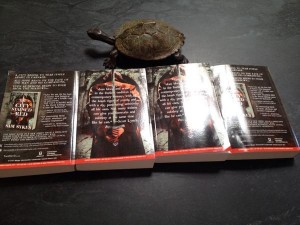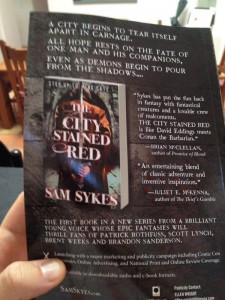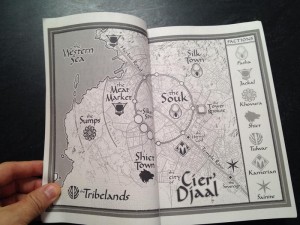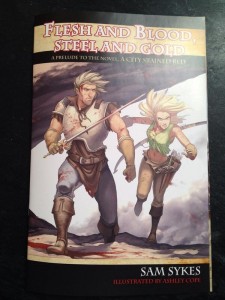There probably a dozen good reasons to hate Robert J. Bennett.
For one, he is an absolutely dreadful housemate, I’m told, insisting on performing morning calisthenics at 6 AM and livestreaming the events from a GoPro situated on the floor between his legs with the lens pointed up. He has a lengthy list of academic credits, most of which involve the words “Why My Neighbors Are Mad At Me For Putting Something In Their Closet” somewhere in the title. And we need not go into his brief entrepreneurial foray into the world of funeral clowns.
But if you had to narrow down one specific reason, it should probably be that he is brilliant and I hate that.
Doubtlessly, if you follow the link above, you’ll at some point delve into his blog. You’ll find things there that are frightening in how intelligent they are (my favorite is this one on fandom). His books, including the upcoming City of Stairs (which I highly recommend), are absolutely no different. He remains the sole author I cannot leave in my bathroom because the specific way he works his prose and ideas demands more attention than I can divide between a poop and the throes of bodily egress.
Honestly, Robert is the author that will have shaped the stories we’ll be telling twenty years from now. He’s that good. Even when I disagree with him.
Such as when he wrote this post about genre labeling.
Now, neither the fact that I disagree with him nor the fact that he is brilliant are what cause me to loathe him in this particular instance. Rather, it’s the fact that he has successfully made me feel very, very old.
I know that sounds like the opening to a rant in which I’ll chuckle about how different things used to be and, somewhere in there, throw a passive-aggressive and wholly alarming insinuation about how much “purer” the genre was back then, but rest assured that the idea of fading youth was just a passing fancy. I only bring it up because I remember wholly feeling how Robert feels right now.
I don’t think any author sits down, cracks their knuckles and says: “Well, time to write something wholly derivative and entirely reminiscent of previous iterations and shovel that once-original shit down the gaping craw of a populace ready to consume.” We all like to think we’re original geniuses. That’s not to say that we aren’t–indeed, just by letting our own enthusiasm seep into our work, even our own iterations of the same ideas will be original. But I think there comes a rather difficult point in every writer’s life where they sit down and think the same thought.
“Why aren’t people seeing what I’m seeing?”
When we first start out and someone asks us “what do we write?” We describe ourselves and our work in vague, nebulous terms as we struggle to come to grips with what we might be and avoid calling ourselves something we might regret later. As we move on, we become more confident in what we write and describe ourselves in more rigid terms. Then a number of things happen: reviewers call us completely different things, readers call us completely different things, the people we had hoped would like us do not. And then typical publishing career issues rear up: the economy changes, we don’t sell as well as we hoped, sometimes we don’t sell at all. And all of this culminates in a moment of dread where we start asking ourselves question.
“Am I not what I thought I’d be?” “Was I never what I thought I was?” “Or am I just not very good at what I want to do?”
If this sounds overly specific, it’s because I went through this when my books came out.
I liked to say I was writing chiefly character-driven drama featuring supernatural elements derived from a meeting of ancient world mythology and religious philosophical aspects. When that got too long (and people seemed less interested), I started calling it in-depth character studies of people in a secondary world. For a very long time, I tried to avoid calling myself “fantasy.” I tried to avoid saying words like “sword fights,” “monsters,” “magic,” “banter,” “cursing,” “poop jokes.” I said “character-driven,” “thoughtful studies,” “broken people,” “fantastic elements.” All those things from both sentences are true, but the former had an element of joy that I felt afraid to acknowledge, lest it seem like I’m not a serious writer.
Then the reviews started coming in. I started hearing different words. From people who liked me, I heard words like “epic fantasy,” “sword and sorcery,” “classic dungeon-delving,” “party-based.” From people who didn’t like me, I heard words like “D&D,” “video game fiction,” “tie-in fiction but worse,” “blood-soaked goreporn,” “nihilistic grimness” (we didn’t have grimdark back then).
Genre titles and I hated them all, good and bad. I wanted to resist them, lest I be tied down to one of them. I didn’t want to be branded “the sword and sorcery” guy anymore than I wanted to be the “D&D but bad” guy. I wanted to be me, Sam Sykes, and I wanted people to expend massive amounts of breath in describing what I did.
I have no idea if Robert went through or is going through the same thing. But my experience runs counter to his claim that people want to know a genre first and then buy you. In my experience, people will form their ideas about you and then put you in the genre that best allows them to embrace or dismiss you (check out this Penny Arcade strip to see what I mean).
Don’t get me wrong: the idea is super-alarming and, in a lot of cases, harmful. You could probably find a lot of people out there who make the declaration that they don’t read urban fantasy and then find the Dresden Files and Iron Druid Chronicles on their shelves, but a distinct lack of women epic fantasy authors.
And don’t get me wrong, I hate the idea of “the genre” as an all-encompassing monolith or means of demarcating tribal lines.
But I don’t know if these are the faults of genres, specifically.
I used to, of course. I would agonize over them, being called one thing or another as though that would put me on one side of the tribal line. I wrote my book, Black Halo, from that perspective and it is, I feel, my weakest one. It was a source of stress and sadness for me.
I function peculiarly in that I can reach a certain stress threshold and then simply…not care anymore. My body seems to register that, if I get any more angry about a subject it’ll cause me some serious harm, and releases some chemical that makes it seem less important. This eventually followed Black Halo’s publication and reception (which was not up to expectations). And I went through a moment of zen.
I stopped stressing. I started writing from a different place. I wrote a book I loved. And because I loved it, I wanted to put a lot of effort into it, because I was interested in it, because it caused me joy, because I was passionate about it in a way that I hadn’t been when I was dedicating my energies to worrying about how the book would be received.
These days, when people come up to me, I get a variety of different genres.
“Your book is the most epic thing I’ve ever read!”
“Your book really reminds me of the old Conan the Barbarian fantasy novels.”
“Your book is like a really fun D&D campaign!”
“Your book made me cry.”
My reaction to all of these is the same: “Awesome!”
Genres are, from a publisher’s standpoint, useful tools: they are ever-changing, they are shifted to match current moods and market trends. We didn’t have “epic fantasy” as a classification several years ago and a few years from now, “grimdark” will probably be an actual marketing word. It’s useless to fight against this.
But genres from a reader’s standpoint? I appreciate those. People will tell me a lot about what they thought about the book just by what genre they put me in. Those who call me epic fantasy will tell me they liked the plot. Those who call me sword and sorcery will tell me they liked the combat. Those who call me D&D will tell me they liked the character interactions (and often the romance, if you can believe that). Sometimes they won’t even use a genre. Sometimes they’ll just call it “my book.”
That is a good moment. When the work speaks for itself. When your name becomes its own genre.
I do sympathize with Robert’s concerns, just as I don’t envy his problems. Like I said, he’s a genius, and he’s going to have the problems all geniuses have of talking to people on a level where they can communicate effectively. Genre, as a concept, may be more important to him than most because his books so clearly transcend genre.
And I do think there are issues in how we argue and categorize books. Same Six Names Syndrome, anyone?
And maybe it’s just because I am feeling old, but I don’t think genre is that bad of a thing anymore. I don’t think it’s worth it to split hairs over that. When I’m on a panel and the moderator says “let’s begin by defining the genre,” I rarely bother to hide my groan and most of the other authors on my panel follow suit. We’ve done this a lot. We’ve discussed the intricacies to death. We’ve fought bloody wars over what constitutes epic versus not-epic, high versus low, urban versus rural. It’s a conflict that is never going to go away because genres, as a concept, are probably never going to go away.
I used to be more upset about this than I am now. It used to bother me to be known as sword and sorcery over epic, epic over character-driven. It used to bother me to be put in one genre or another. But now?
I’m content to let the reader decide what is epic to them.
That’s just fine by me.













